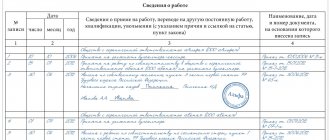Our hotline and groups constantly receive questions related to transfer to an equal position, dismissal, and they also ask about the difference between an equal position and a lower and higher position. So let's talk about all this today.
Let's start with the basics of what an equal position is.
According to Decree of the President of the Russian Federation of September 16, 1999 N 1237 “Issues of military service”:
A military position of a serviceman is considered equal if the state provides for it a military rank equal to the military rank of the previous military position and an equal monthly salary in accordance with the military position held. 15. The appointment of a military serviceman to an equal military position is made: a) according to official necessity; b) in connection with organizational and staffing measures; c) for more expedient use of a serviceman in military service; d) for family reasons at a personal request (for a serviceman performing military service under a contract); e) for health reasons in accordance with the conclusion of the military medical commission (for a soldier serving under a contract - with his consent); f) based on the results of the competition (for a military serviceman serving under a contract).
And some of the most common questions, problems and legal disputes, among other things, are mainly the first 2 points. Let's dwell on them.
So, transfer on official need. And probably the main question is whether it is possible to refuse it. Let us explain - the answer to this question is already contained in Decree 1237, we read: A military serviceman can be transferred to a new place of military service due to official necessity with appointment to an equal military position. The transfer is made without the consent of the military personnel, with the exception of the following cases: a) if it is impossible to perform military service in the area where he is being transferred, in accordance with the conclusion of the military medical commission; b) if it is impossible for family members of a serviceman (wife, husband, children under the age of 18, children-students under the age of 23, disabled children, as well as other persons dependent on the serviceman and living with him) to live in the area , where he is being transferred, in accordance with the conclusion of the military medical commission; c) if there is a need for constant care for a father, mother, sibling, grandfather, grandmother or adoptive parent living separately, who are not fully supported by the state and who, in accordance with the conclusion of the federal medical and social examination institution at their place of residence, need permanent outside assistance care (assistance, supervision).
Thus, it is obvious that the law strictly contains circumstances when a serviceman may not agree with a transfer to an equal position and they are necessarily confirmed by the conclusion of a medical organization; in other cases, the consent of the serviceman is not required. In addition, please note that the transfer can be carried out within the armed forces of the Russian Federation.
More details in the 74th issue of the military-legal blog:
The next frequent question from military personnel is whether it is possible to refuse a transfer to an equal position if the VUS does not match. The answer is simple and, again, we have already voiced it above; the law does not connect the movement of a military personnel with the criteria for military training. Moreover, we look at Decree 1237 which tells us the following:
The appointment of military personnel to military positions must ensure their use in their main or single-profile military specialty and taking into account their existing service experience. If it is necessary to use military personnel in positions in a military specialty that is new to them, their appointment to these positions, as a rule, must be preceded by appropriate retraining.
You see the phrases “if necessary”, “as a rule”, that is, here the commander is actually given the right to send or not send for retraining. And this is precisely what the command has the competence to decide - whether you are suitable for the position to which you are being transferred or not. This is also evidenced by the existing law enforcement practice.
To confirm this, we will show a typical excerpt from the court decision: “As follows from the above legal norms, the difference in job responsibilities for equal military positions does not prevent the appointment of a serviceman to an equal military position in the main or single-profile military service, regardless of the opinion of the serviceman on this matter.” Let's move on to the next point and analyze the relationship with organizational and staffing measures.
Transfer to an equal position and general education. And the military here most often asks whether it is possible to resign if they undergo general training in a military unit. The answer to this is also contained in the current legislation.
A serviceman performing military service under a contract may be early dismissed from military service in connection with organizational and staffing measures (subparagraph “a”, paragraph 2 of Article 51 of the Federal Law) in the absence of other grounds for dismissal: if his military position is reduced (position), the impossibility of appointment to an equal military position (position) and the lack of his consent to appointment to a higher or lower military position (position).
Thus, the dismissal of a serviceman on the specified basis is the right of the commander, and not an obligation. At the same time, it is necessary to clarify that this should not be confused with dismissal according to the general military instruction if, according to the Military Military Commission, the serviceman is declared unfit for the military service. You can watch the blog about this, the link will be under the video. Let us note that the entire order must be observed here before the serviceman has the opportunity to resign under the general order of military service, if there is such a desire.
As for the transfer in connection with the general military training to an equal position, it is also carried out without the consent of the serviceman. Let's go further, very often we hear the following statement from young lieutenants - if you serve for less than a year, then you have no right to transfer. And they ask us if this is true.
We answer - there is no such thing, the above-mentioned rules of law clearly speak about this. Therefore, friends, if such doubts arise, you can always open the Procedure for Military Service and read it again. Many questions will disappear, but if anything remains, welcome to our forum, the link is below, all the answers are already there.
Also, from time to time, young lieutenants have questions about the difference between an equal position and a lower and higher one. Let me remind you. A military position is considered the highest if the state provides for it with a higher military rank than the military rank for the previous military position, and if the military ranks provided for by the state are equal, a higher monthly salary in accordance with the military position held. A military position of a serviceman is considered lower if the state provides for it with a lower military rank than the military rank for the previous military position, and if the military ranks provided for by the state are equal, a lower monthly salary in accordance with the military position held.
When appointed to a higher or lower position, the consent of the military personnel must be unambiguous. If everything is clear with the appointment to a higher position, then please note that they can be appointed to a lower position without the consent of a serviceman in order to implement the disciplinary sanction “demotion in rank” or “reduction in military rank by one step with transfer to a lower position,” as well as if, within a year after the imposition of the disciplinary sanction “warning of incomplete service compliance,” the military man did not correct his behavior by exemplary performance of military duty and the penalty did not play its educational role. In other words, they don’t have the right to simply demote someone. With this, I think, we have sorted out the differences between positions and that’s all for today, improve your legal literacy with Nachfin.info, read and watch our blogs!
Reviews of the work of the legal bureau Nachfin.info-39 >>>
Legal bureau "Nachfin.info-39"
Dismissal based on general education, if, according to the Higher Inspection Code, you are not fit for the VUS >>>
Discussion of problems of transfer to an equivalent position on our forum >>>
Grounds for transferring a serviceman to another unit: what are the exceptions?
In the Regulations on the procedure for completing military service, the grounds for transferring a serviceman from one military unit to another are indicated by paragraph 1 of Article 15 “Procedure for transfer to a new place of military service.” Their list contains the main formulations of the reasons for transfer to a new duty station, namely:
- according to official needs;
- in order of promotion;
- for health reasons in accordance with the conclusion of the military medical commission;
- for family reasons;
- at personal request;
- in connection with organizational and staffing events;
- in connection with a planned replacement;
- in connection with enrollment in a military educational institution, postgraduate studies, military doctoral studies or expulsion from them.
As a special reason for transferring a serviceman to another unit, a situation is also indicated when, taking into account the nature of the crime committed, a serviceman who has been sentenced to a restriction on military service cannot be retained in a position related to the management of subordinates.
As follows from the above list of grounds for transferring military personnel to a new duty station, in many cases such a transfer requires personal consent on the part of the serviceman himself. Without such personal consent, the translation will be considered illegal and unreasonable if:
In accordance with the conclusion of the military medical commission (MMC), it was determined that it was impossible for the serviceman (medical contraindications) to perform military service in the area where he was being transferred.
There is a similar conclusion of the Military Military Commission, confirming the impossibility of living in the area designated for transfer for family members of a serviceman. The latter includes the wife, husband, children under the age of 18, student children under the age of 23, disabled children, as well as other persons who are dependent on the military personnel and living with him.
If there is a need for constant care for a father, mother, sibling, grandfather, grandmother or adoptive parent living separately, who are not fully supported by the state and who, in accordance with the conclusion of the federal medical and social examination institution at their place of residence, need constant outside care ( assistance, supervision).
In addition to the lack of personal consent for transfer in cases stipulated by the current procedure for military service, another important exception in which transfer to another unit cannot be carried out is the situation when both spouses serve in the ranks of the RF Armed Forces within the same locality (garrison). In this case, the decision to transfer one of the spouses must be made with mandatory consideration for the other spouse’s possibility of potential relocation. If it is impossible to simultaneously appoint military spouses to military positions in the same new place, transfer to a new place of military service is not carried out.
In addition, paragraph 11 of Article 15 of the Regulations on the procedure for military service states that while serving an arrest, a convicted serviceman cannot be transferred to a new place of military service.
Transfer of a serviceman to another military unit - benefits
Transferring a serviceman to another place implies leaving the previous one, and therefore such a step can be called a partial dismissal from that point. That is why, before the official removal from the place, it is necessary to make a calculation for the accumulated position.
In addition, certain costs will have to be incurred when moving to a new place. That is why, in any case, it will be paid for with public funds. Moreover, if necessary, each family member is paid compensation for inconvenience caused in the amount of 0.25 of the official’s salary. It is officially issued either in a new unit after the transfer, or after the order is signed directly by management.
Attention! Due to recent changes in legislation, the legal information in this article may be out of date! Our lawyer can advise you free of charge Ask a question to a lawyer
Transfer of a contract soldier to another unit
A soldier serving under a contract. may be transferred to a new place of military service from one military unit to another, including one located in a different area, in accordance with the same above-mentioned grounds established by paragraph 1 of Article 15 of the Regulations on the procedure for military service. It should be noted that three such grounds are specifically noted as applying only to career military contractors. It is a translation:
- at personal request;
- for family reasons (also due to a personal request);
- due to a planned replacement.
The last of these points is regulated in detail in Article 16 of the Regulations on the Procedure for Military Service. It has been established that military personnel undergoing military service under a contract in the Far North and equivalent areas, areas with unfavorable climatic or environmental conditions, as well as in military units located outside the territory of the Russian Federation are subject to planned replacement.
The lists of such localities and the duration of military service in them are determined by the Government of the Russian Federation. The expiration of the period established for service in these “unfavorable” areas requires the mandatory replacement of military personnel serving there. Moreover, the servicemen being replaced are not given the right to choose the place of further military service.
At the same time, paragraph 4 of Article 16 allows a serviceman to continue military service in the mentioned areas if he has his consent with the simultaneous existence of official necessity. In this case, the additional period of military service must be established in agreement with the serviceman and be at least one year.
How to transfer to another unit as a conscript
Unlike soldiers who signed a contract with the military department, and thereby received in many cases the right to avoid transfer to another unit without their approval, a conscripted soldier is transferred to a new place of military service without his consent. This norm is approved by paragraph 4 of Article 15 of the Regulations on the procedure for military service. That is, when the decision to transfer a conscript soldier is made on the initiative of the command of a military unit or at a higher level, there are no grounds to challenge it under the law.
An important nuance regarding the transfer of conscripts for health reasons is contained in paragraph 79 of the Manual on the recruitment of soldiers, sailors, sergeants and foremen into the armed forces of the Russian Federation, approved by Order of the Ministry of Defense No. 30 of January 16. 2001 It was established that sailors and foremen from the contingent of conscripts serving on Navy ships and recognized for health reasons as not fit enough for service are subject to transfer to coastal military units of the fleet.
However, there are two types of cases when a conscript soldier can transfer to another unit at his own request:
- According to the conclusion of the military medical commission, which will confirm that the climate situation in the region where the unit is located is unsuitable for service.
- For family reasons, when there is a need to live close to home.
In the latter case, a conscripted soldier can be transferred to one of the military units stationed near his place of residence if he has a child or needs to care for sick (or reached retirement age) parents. This allows the implementation of Order of the Ministry of Defense of the Russian Federation of October 2, 2007 No. 400 “On measures to implement the Decree of the Government of the Russian Federation of November 11, 2006 No. 663”, but with an important caveat - “if possible.” In this case, the citizen is obliged to document the presence of these relatives.
A conscript soldier seeking transfer to a unit near his home has the right to write a report addressed to the unit commander, which describes in detail the circumstances that have arisen and indicates a list of attached evidentiary documents. Such transfer request may be taken into account.
The chance of a favorable outcome increases significantly if the serviceman’s relatives also show sufficient activity. As a rule, the legal spouse or mother of a conscript soldier should contact the higher management of the unit. They must state that they are aware of the report written by the soldier and will petition for it. In case of refusal, relatives can contact representatives of the Ministry of Defense and try to appeal this decision.
Read also
- Dismissal of military personnel without provision of housing subsidies.
- Housing subsidy - issues for military personnel. Quick reference.
- What you wanted to know about military mortgages - a quick guide
- Is it possible for a military member to go bankrupt?
- Receipt by military personnel of savings and additional benefits in the NIS by order of the Ministry of Defense No. 477 (instead of PMO No. 245)
- Legal stories NachFin.info-39. How we returned half of the housing subsidy to the military through the court
- Why income from investing in military mortgages depends on a competent approach and how not to lose your money
Transfer procedure to a new duty station: recommendations for military personnel
In general, all procedures associated with transfer to a new duty station are standard and are carried out in accordance with the norms of Article 15 of the Regulations on the Procedure for Military Service. The transfer process on the personal initiative of a contract soldier can last up to a year. If there is an urgent need for translation, it is worth starting the process as early as possible. The mere desire to transfer to another unit is not a valid reason. The arguments given in the report must be substantiated.
In the case where a career soldier wishes to achieve a transfer to a new duty station on his own initiative, first he is recommended to firmly decide on the military unit in which he would like to serve. Then you need to get an appointment with the commander of this military unit (preferably with educational documents) and ask for a permit for transfer to this unit if there are vacant positions.
If such consent is received and a certificate is issued, the serviceman must submit a written report to the commander of his unit for transfer, attaching the received certificate. It is important that the submitted copy of the report in the office is marked Bx. No. In addition, before submitting a transfer report, it is recommended to visit with this regard the department or personnel department of the connection in which the service takes place in order to receive detailed advice on further actions. You should also ask for translation assistance there.
If there is no relationship, but the serviceman wishes to serve in another district or in another fleet, then he must contact the personnel department at the place of service in person. The responsibilities of the unit command do not include carrying out a transfer initiated by the contract soldier himself - he will have to seek permission for the transfer on his own. Based on the results of receiving approval for the transfer, during the subsequent procedure, you will need to issue a bypass sheet and go through it, redirect the documentation, and send a submission for the expulsion of the contract employee. After this, the translation is considered complete.
Delivery of cases and positions
In case of transfer to a new place of military service, a military serviceman is sent there after handing over his cases and being released from his military post. The procedure for handing over cases is regulated by the Manual on Military (Ship) Economy in the Armed Forces of the Russian Federation. All officials, when appointed to a position or transferred to a new duty station, must personally accept and hand over cases and positions.
To receive (hand over) cases and positions, starting from the head of the service of the formation (military unit) and above, a commission is appointed by order of the commander of the formation (military unit). Acceptance of cases and positions is carried out personally by the person accepting from the handing over person in the presence of the commission.
Acceptance (delivery) of cases and positions includes:
- study by the host of the state of the military (ship) economy (service), familiarization with the officials responsible for economic activities;
- comparison of data from the logistics service on the availability of material assets according to the assigned nomenclature with the accounting data of supplying authorities for their compliance;
- transfer by the person handing over the position, and at the same time inspection and acceptance by the person accepting the position, of material assets, as well as documents;
- Documentation of acceptance (delivery) of cases and positions.
Transfer deadlines
The regulation on the procedure for military service in paragraph 7 of Article 15 establishes a single maximum period for transferring to a new place of service - no later than a month from the date the military unit received the order or written notice of its transfer. When calculating the duration of cases, the period when the serviceman is on leave, on a business trip or undergoing treatment is not included.
The transfer of military personnel by way of planned replacement in an area where the period of military service is established is carried out no less than one year before the expiration of their military service (contract term), as well as no less than three years before reaching the age limit for military service.
How to terminate an employment relationship for a military wife
Military personnel are entrusted with the responsible task of protecting the state and citizens.
To accomplish this, they and their families have to constantly change their place of residence and adapt to new conditions. Therefore, in order to respect the rights of wives of military personnel, labor legislation provides for the possibility of their terminating professional relationships in a special manner. Download for viewing and printing: Order of the Minister of Defense of the Russian Federation dated July 11, 2002 N 265 On payments to the wives of military personnel
Dismissal procedure
If a spouse carrying military duty is transferred to another unit located in another city or even outside the Russian Federation, then the working wife must:
- write a letter of resignation, indicating as the reason the husband’s transfer to serve in another area, as well as the date of the event;
- attach the original document confirming what was written (certificate from the unit command in a certain form);
- receive the necessary documents and payment at the place of work.
Attention!
A military wife is not required to work 2 weeks before dismissal when her spouse is transferred to service in another territory. The entry in her work book must contain the full reason for the dismissal, and not just look like “dismissed at her own request.” Sometimes the employer refuses to make a full entry in the length of service document, citing the fact that the Labor Code does not indicate such a basis. However, there are instructions for filling out work books, where such a form is specified. A correctly completed dismissal entitles military wives to compensation in the amount of two months' average salary.
If a serviceman is transferred to serve in another unit within the same locality, and his wife wants to resign, then she can do this only on a general basis. At the same time, she is not provided with any benefits (exception: termination of the employment contract by agreement of the parties, reduction of staff or headcount, liquidation of the company).
Dismissal when the husband is transferred to a new duty station in another locality
If a serviceman's wife is dismissed for the specified reason, she is entitled to certain compensation. She will also be able to terminate the employment relationship even while on vacation on the day she needs, without waiting for the end of the vacation.
Transfer of a serviceman for various reasons:
Depending on the circumstances of the transfer of military personnel to a new duty station, the main conditions of this procedure can be divided into three large groups:
- For official reasons (including without the consent of the serviceman). In practice, this basis is also equivalent to a transfer in connection with organizational and staffing measures or a planned replacement.
- At the personal request of a serviceman (including for family reasons).
- Due to circumstances related to training in military educational institutions.
The latter option is described in particular detail in Article 15 of the Regulations on the Procedure for Military Service, with regard to the consequences of potential expulsion from military educational institutions for indiscipline, poor academic performance or unwillingness to study, as well as for refusal to enter into a contract. This is due to the legally established norm, according to which those expelled from military educational institutions become obliged to serve a period of military service upon conscription. However, for them the period of military service before entering a military educational institution and during training is counted, based on the standard rule - two days of military service under a contract (in a military educational institution) for one day of military service on conscription.
Military personnel with the military ranks of officers and warrant officers/midshipmen (as well as male contract soldiers in any rank), expelled from military educational institutions, postgraduate studies, military doctoral studies, but at the same time wishing to continue military service and enter into a new contract, have the right to do so . They are sent to a new place of military service, where they enter into a new contract for military service.
According to official needs
A serviceman performing military service under a contract may be transferred to a new place of military service due to official necessity with appointment both to an equal military position and to a higher one. In the latter case, transfer in the order of promotion with appointment to the highest military position is carried out exclusively with the consent of the serviceman himself.
If there are organizational and staffing measures in a military unit, the commander has the right to:
- place the serviceman at disposal for a period of no more than six months;
- offer to occupy a higher or lower military position with the consent of the serviceman;
- appoint to an equal military position without the consent of the serviceman.
During organizational and staffing events, a military personnel may agree to be transferred to a new place of military service (if appointed to a higher or lower military position), declare a refusal to be appointed to a higher or lower military position and desire to resign from military service on the grounds in question.
A transfer with appointment to an equal military position (including as a planned replacement for further service in areas with special conditions) can be made without his consent, except for the cases specified in Article 15 of the Regulations on the Procedure for Military Service.
At personal request
At the personal request (report), contract military personnel are transferred in three cases, one way or another related to the health status of themselves or their family members:
- If the climate of the area where the service takes place is not suitable for the soldier due to his health condition.
- If a serviceman has a minor child, student children under 23 years of age, or disabled children, and they cannot be in the climatic conditions of the area where the soldier serves.
- If a serviceman needs to care for elderly or sick parents, brother, sister, grandfather, grandmother or adoptive parent in the case when loved ones are not on government support.
The possibility of such a transfer in the latter option is regulated by the conclusion of doctors and social workers. The need for transfer in other cases is determined only by the results of a military medical commission.
Without his consent
The transfer of a serviceman to a new duty station without his consent is carried out in any case when, taking into account the nature of the crime committed, the serviceman who has been sentenced to a restriction on military service cannot be retained in a position related to the management of subordinates. But this happens very rarely.
Much more often, a transfer to another duty station, which does not require the consent of the serviceman himself, is carried out due to official necessity with an appointment to an equal military position (including in the order of organizational and staffing measures or a planned replacement for further service in areas with special conditions). It can be carried out, with the exception of the cases specified in Article 15 of the Regulations on the Procedure for Military Service, which relate to the above-listed grounds for transfer at a personal request.
For family reasons
The transfer of a serviceman for family reasons to a new place of military service is carried out in the same cases as indicated above as carried out at a personal request for those serving military service under a contract. Of course, with the exception of the basis of an unsuitable climate for his own health.
That is, the impossibility of living for family members of a serviceman (wife, husband, children under the age of 18, student children under the age of 23, disabled children, as well as other persons dependent on the serviceman and living with him) is taken into account, confirmed by doctors. him) in a given area or the need for constant care for a father, mother, sibling, grandfather, grandmother or adoptive parent living separately who are not fully supported by the state and need constant outside care (assistance, supervision).
Transfer of a serviceman to a new duty station - legal nuances
The transfer of a serviceman to a new duty station is often carried out directly at the request of the person himself, and not at the request of government authorities, and therefore we will consider exactly this model of the situation. However, even this should be understood that the process does not differ much in different variations and everything we have indicated will work in any case.
The first step is to discuss the first steps. Of course, you need to notify senior management about your decision by drawing up a special report. As such, it does not have a legally established form, but the document must contain information regarding:
- Serviceman's contact information;
- Description of the current situation. That is, it is simply not possible to transfer from one unit to another at your own request, and therefore for this you need to have a number of valid reasons. Each of them is established at the legislative level and later we will talk about this, among other things;
- Date of document preparation and signature.
In addition to the application, a package of documentation must be submitted. It is installed on an individual basis, depending on the circumstances. The main thing in this package will be evidence of the need for translation. They can be provided in the form of official paper, such as a certificate or something similar.








